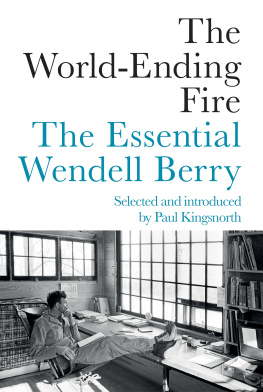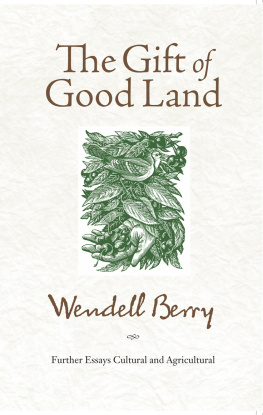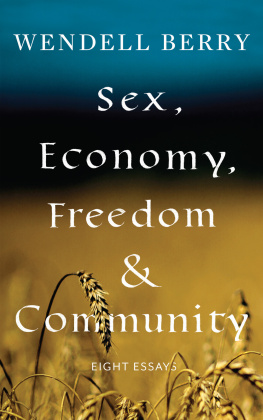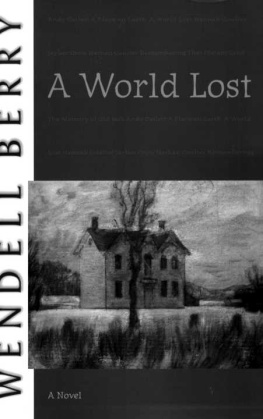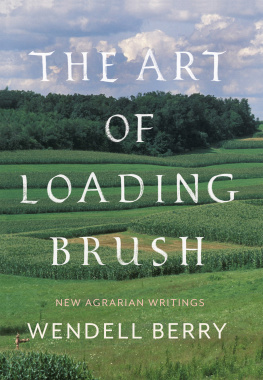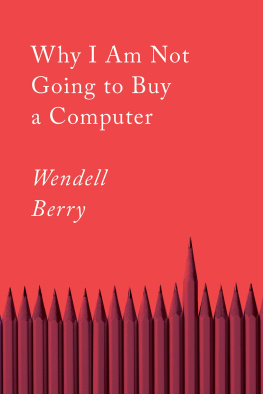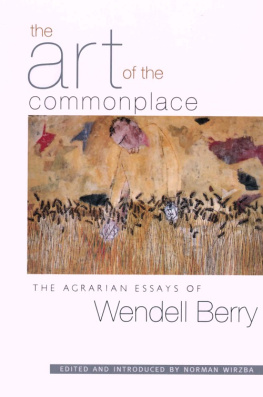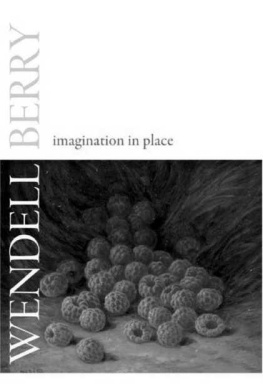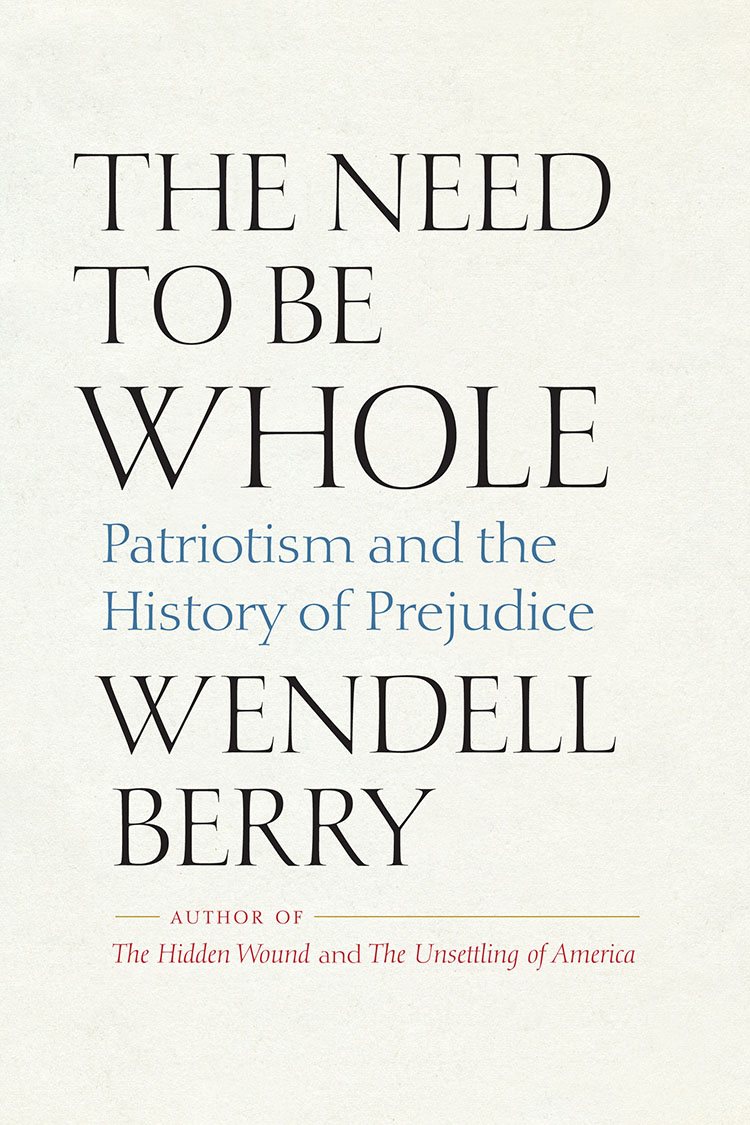
The Need to Be Whole: Patriotism and the History of Prejudice
Copyright 2022 by Wendell Berry
All rights reserved under International and Pan-American
Copyright Conventions.
No part of this book may be used in any manner whatsoever
without written permission from the publisher, except in cases of brief
quotations embodied in critical articles and reviews.
Library of Congress Control Number: 2022935000
ISBN: 978-8-9856798-0-9
eISBN: 978-8-9856798-1-6
Cover and interior design by Gopa & Ted2, Inc.
Printed in the United States of America
Shoemaker & Company
Distributed by Publishers Group West
10 9 8 7 6 5 4 3 2 1
We can go through the world being half people, and most of us do that most of our lives.
Porch Talk with Ernest Gaines
No one would claim victory, which was no problem for us. A fundamental principle of nonviolence is that there is no such thing as defeat once a conflict is justly resolved, because there are no losers when justice is achieved.

I believe the power and the endurance of Martin Luther King Jr.s vision and leadership was the fact that it extended to all people, regardless of class or race.

We are one people, one family, one house.
John Lewis, Walking wth the Wind
In the West our peculiar civilization was based upon regional autonomy, whose eccentricities were corrected and sublimated by the classical-Christian culture which provided a form for the highest development of mans potentialities asman. Man belonged to his village, valley, mountain, or seacoast; but wherever he was he was a Christian whose Hebraic discipline had tempered his tribal savagery and whose classical humanism had moderated the literal imperative of his Christianity to suicidal other-worldliness.... The myth of science which undermined this culture and created the modern economic man rooted out the regional economies, and is now creating a world regional economy.... Regionalism without civilizationwhich means, with us, regionalism without classical-Christian culturebecomes provincialism; and world regionalism becomes world provincialism. For provincialism is that state of mind in which regional men lose their origins in the past and its continuity into the present, and begin every day as if there had been no yesterday.... I am convinced that even the die-hard traditionalist would deny his own shrinking tradition if he refused to act for the remnant of it left because he cant have it all. For this remnant may be useful; there will be a minority with a memory...
Allen Tate, The New Provincialism
To think in terms of ideology rather than of geography accorded with inclinations of the American mind.
John Lukacs, Confessions of an Original Sinner
The real science of political economy... is that which teaches nations to desire and labour for the things that lead to life: and which teaches them to scorn and destroy the things that lead to destruction... The great and only science of Political Economy teaches them... what is vanity, and what substance; and how the service of Death, the Lord of Waste, and of eternal emptiness, differs from the service of Wisdom, the Lady of Saving, and of eternal fulness...
John Ruskin, Unto This Last
The Indian knows that even the smallest animal has great importance and can teach us great things. So too, all the little things we do every day have great importance. Our life is full of many little things in each day and in every moment. We should not concentrate on some great event that we expect to come in the future, but in the correct performance of all our daily obligations. In this way, we will show respect for all created things and for Acbadadea [the Creator].
Thomas Yellowtail, Yellowtail: An Autobiography
From my experience with leisure I have learned that too much of it is not good. Having not quite as much as you would like gives a greater value to the time you do have, and it gives a drive and conciseness to your productions.
Anyway, I prefer to do my own work, lowly as it may seem to the proud ones for whom the use of arms and legs is to be avoided at all costs. It is a simpler way, and the rewards are independence, and satisfaction of accomplishment, and the pleasure of being out-of-doors when the sun sets.
Harlan Hubbard, Payne Hollow
[L]o, we bring into bondage our sons and our daughters to be servants, and some of our daughters are brought unto bondage already: neither is it in our power to redeem them; for other men have our lands and vineyards.
Nehemiah 5:5
It is worth noting that our modern notion of the industrial society, in which each seeks a share in the material exploitation of Nature, would not be regarded as a society at all by Plato or Aristotle, but as a form of political degeneration.
Joseph Milne, The Heavenly Order and the Lawful Society
Mencius said: You cant talk sense to the inhumane. They find repose in risk, profit in disaster, and joy in what will destroy them. If you could talk sense to them, would there be ruined countries and ravaged houses?
Mencius, translated by David Hinton
The test of a mans freedom is his responsibility as a workman. Freedom is not incompatible with discipline, it is only incompatible with irresponsibility. He who is free is responsible for his work. He who is not responsible for his work is not free.
Eric Gill, A Holy Tradition of Working
[T]he marvelous advances in technique made during recent decades are improvements in the pump, rather than the well.
In all of these cleavages, we see repeated the same basic paradoxes: man the conqueror versus man the biotic citizen; science the sharpener of his sword versus science the searchlight on his universe; land the slave and servant versus land the collective organism.
The case for a land ethic would appear hopeless but for the minority which is in obvious revolt against these modern trends.
A thing is right when it tends to preserve the integrity, stability, and beauty of the biotic community. It is wrong when it tends otherwise.
Aldo Leopold, The Land Ethic
You work from the heart out, you dont work from the issue down.
Conversations with Ken Kesey
Both grandparents owned land. Like Booker T. Washington, they understood that black folks who had their forty acres and a mule, or even just their one acre, could sustain their lives by growing food, by creating shelter that was not mortgaged. Baba and Daddy Gus, my maternal grandparents, were radically opposed to any notion of social and racial uplift that meant black folks would lead us away from respect for the land, that would lead us to imitate the social mores of affluent whites.
bell hooks, Belonging: A Culture of Place
Contents

T HE N EED TO B E W HOLE
Introduction



